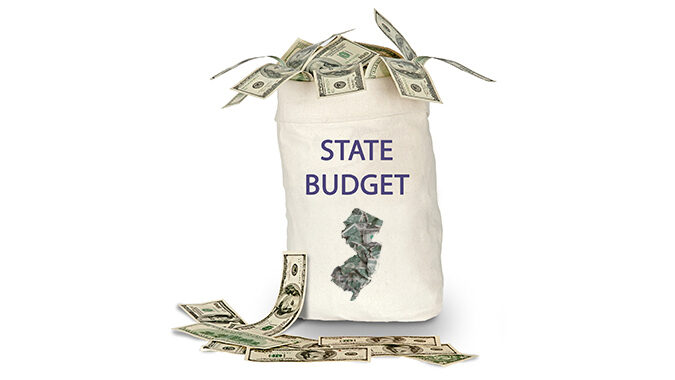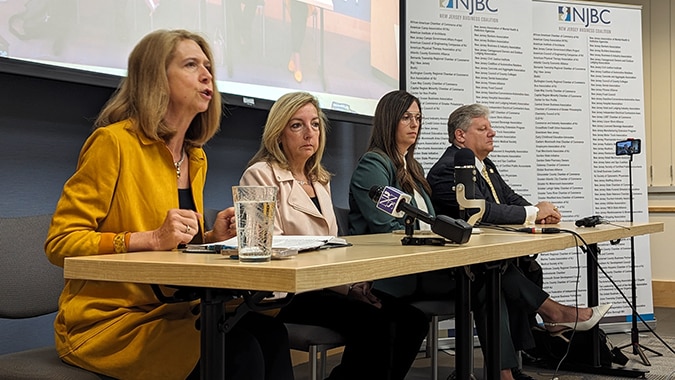On behalf of our member companies that make NJBIA the largest statewide business association in the nation, thank you for the opportunity to speak with you today regarding the recently proposed FY2023 (FY23) State Budget.
We have been hearing a lot about AFFORDABILITY lately, both in the Legislature and in the Governor’s Budget Message, but what does that mean in the context of the state budget? As has been often acknowledged by many in both parties, New Jersey is not as affordable as we want and need it to be for our individuals and families, our small businesses, and our large corporations, and NJBIA would argue that every decision in our state budget can make that better or worse. As you would expect in a massive $48.9 billion budget, we have a little of both – some budget decisions that will make us more affordable and some that make us less.
NJBIA’s budget testimony will discuss:
- Affordability Through Fiscal Responsibility – The FY23 budget features some continued initiatives by the Murphy Administration that are trying to right the state’s fiscal ship, and these will eventually relieve budget stress so the state could have more resources to address affordability.
- Affordability Through Stimulating the Economy – The budget includes some pro-growth spending that will spur economic development and generate increased income and revenue that could make New Jersey more affordable. But is it enough?
- An Unsustainable Budget is Not Affordable – Despite some fiscally responsible initiatives, NJBIA is concerned that the budget includes an unsustainable structural imbalance for the second year in a row with spending exceeding revenue by $1.7 billion.
- Ways to Make New Jersey More Affordable Through the Budget – NJBIA is disappointed that the budget does not provide more direct relief to businesses as they are trying to recover from the devastation wrought by the pandemic, and the business community has budget recommendations to stimulate our economy and make our state more affordable.
Affordability Through Fiscal Responsibility
NJBIA is pleased to see several features of the FY23 budget that can be described as responsible budgeting. Governor Murphy deserves credit for his second straight proposed budget with a full pension payment of $6.8 billion. The looming and increasing pension payments hung over every budget, governor and Legislature for decades, and reaching 100% of the payment for two years in a row is an achievement that can finally start to free up money in the budget to hopefully be used for future affordability initiatives.
This budget also continues Governor Murphy’s strong record of budgets with a bigger cushion. The budget proposal includes adding another $2 billion back into our State’s Surplus Revenue Fund or Rainy Day fund. It includes a surplus of $4.2 billion and puts another $1.3 billion into the Debt Defeasance and Prevention Fund. These budget best practices, especially after the unnecessary borrowing of billions a few years ago, are all strongly supported by NJBIA, and will focus future state revenues on things to grow our economy rather than debt service and paying off other old liabilities.
It is also a strong positive for the budget proposal that it is the second in a row that includes NO proposed tax increases. Governor Murphy’s first three budgets included billions in new taxes, while last year’s and this FY23 proposal rely on revenue growth and prior years cushion without needing new taxes to support spending. A stable and predictable tax environment is important for economic growth and will lead to further natural revenue growth over time.
Also towards a more fiscally responsible budget, Governor Murphy deserves some credit for reducing diversions from certain specific funds such as the Clean Energy Fund and Affordable House Trust Fund. But NJBIA asks the Legislature to explore how to further reduce diversions from dedicated funds such as from workforce development funds in the Department of Labor & Workforce Development when we need more workforce development resources – not less – and from some licensing boards in the Department of Law & Public Safety at a time when we have workforce backlogs.
Affordability Through Stimulating the Economy
NJBIA has long maintained there are three pro-growth spending areas that the state should focus on to stimulate the economy: workforce development, infrastructure and innovation. These types of spending are win-wins for employees and employers, and this budget includes examples of all three. They will help our economy get back to higher-paid sustainable jobs that produce things as opposed to the economy we have unfortunately slipped into with lower-paid and more volatile service jobs.
For workforce development, NJBIA is pleased to see the proposed budget include $9 million more for the New Jersey Community College Consortium for Workforce and Economic Development building off the successful $8.5 million that the community colleges received in last year’s FY22 state budget. NJBIA and our community colleges are partnering on the exciting new career pathways program that NJBIA requested for our community colleges in last year’s budget, “New Jersey Pathways to Career Opportunities,” and we look forward to working with the Legislature and Murphy Administration on this additional $9 million. We hope to extend the Pathways program into childcare, as the pandemic has revealed how important the childcare industry is to our economy, and unfortunately, how vulnerable it can be, especially regarding its workforce. Thank you for last year’s funding and please maintain the proposed funding!
NJBIA is also pleased to see other workforce development funding such as: $22.5 million for apprenticeship programs, $2.5 million towards the new Pay It Forward public-private partnership, $5 million added for a new Wind Institute for Innovation & Training, $4 million for a new pilot program to pay for non-credit training courses at community college and vocational-technical schools and plans to use federal American Resecure Plan funds for green infrastructure, childcare and health care training. Investing in these kinds of workforce development programs will help employees improve their skills, and future job and wage prospects while they help employers better their workforce quality, fill open jobs and increase productivity.
To support infrastructure improvements, the proposal includes using $300 million from federal rescue funds to build affordable housing, $430 million for school construction and renovation, $400 million for higher education facilities that was previously announced and $60 million to continue to support the Drinking Water and Clean Water Infrastructure Fund. Another $65 million for new real estate initiatives is also included to broaden developer diversity, augment transit development and support stranded asset redevelopment. Also covered in the budget are sound investments in our state IT and UI infrastructure and electric vehicle infrastructure. When the budget is in a better cash position, as we find ourselves in because of stronger than predicted revenue performance, federal rescue funds and unnecessary borrowing, infrastructure is a great one-time, non-recurring use of those dollars that will not need to continue from budget to budget. Building something that lasts without requiring new recurring spending makes sense in the position we are in, and NJBIA hopes for more infrastructure spending with the federal funds that are still available.
To support our innovation ecosystem, the FY23 budget proposal includes increasing appropriations for NJMEP (NJ Manufacturing Extension Program), the Commission on Science, Innovation and Technology, $30 million for the new Strategic Innovation Centers and plans to start the new $300 million Innovation Evergreen Fund. These innovation investments all have the potential to attract talent, capital and jobs to our state.
We currently have billions of ARPA funds unallocated that can be used to immediately help our much-needed workforce, such as in healthcare, where our critical workforce is on the front lines of the pandemic. More can be done in all three areas, especially with the unused American Rescue Plan Act (ARPA) funds, but these appropriations are a good start to what NJBIA hopes is more to come.
On top of those three pro-growth spending areas, NJBIA is also happy to see $50 million in additional funding for the NJ Economic Development Authority’s new Main Street Recovery Program. This state support is important for many small businesses that are struggling to recover from the pandemic.
An Unsustainable Budget is Not Affordable
Despite some positives in the proposed state budget, NJBIA is concerned about the level of spending. The $48.9 billion is the largest in state history and has grown more than 5% from the budget signed just over 8 months ago, and the proposed budget has grown by $14.2 billion or 41% over the five Murphy budgets. Even though a substantial portion of that growth is due to pension payment increases, school aid growth and moving items from off-budget to on-budget, it is still worrisome. Even more concerning than the growth is the structural imbalance with this proposed budget spending $1.7 billion more than is coming in with revenues. A budget with appropriations about 4% higher than revenues is not sustainable. Budget sustainability often becomes an affordability issue, because an unsustainable structural imbalance has a nasty way of becoming sustainable through tax increases which our taxpayers just cannot afford. The tax visuals and research later on depict why we can’t afford more taxes.
The budget proposal fails to include any focus on finding savings and efficiencies as did prior proposals from Governor Murphy. It is easy to focus less on that when revenues are strong, but for sustainability purposes, the state should always be looking for further savings.
Ways to Make New Jersey More Affordable Through the Budget/NJBIA Budget Asks
NJBIA would like to see more business relief in the budget, especially after what businesses have endured over the past couple years of COVID-19. The $50 million Main Street funding is only 0.1% of the state budget and only for smaller businesses leasing new space or adding capital costs. To make New Jersey more affordable to do business in, additional relief is needed for all businesses whether that comes in the form of tax relief or further pro-business spending.
On the workforce development and innovation side, NJBIA asks you for a $1 million appropriation to support the new robotics law, A-2455 (Benson, Huttle, DeAngelo)/S-2204 (Greenstein, Oroho), that unanimously passed last year. That law was unfunded but created a new Robotics Competitions in Schools Fund in the NJ Department of Education that should be funded within this state budget. Robotics is an excellent way to get our next generation of workers into STEM and more technical jobs like manufacturing. It supports innovation and entrepreneurial skills and can make a difference over time in getting children to think about alternative technical careers to which they otherwise might not be exposed. An appropriation into this new fund would be a significant boost to school districts trying to launch robotics programs, students advancing their STEM skills and employers desperately in need of workers with technical skills.
In order to support workforce development, innovation and manufacturing, NJBIA requests an additional $1 million for the Secretary of State’s Office per S-1754 (Beach/Testa) to launch a marketing/branding campaign on innovation and why manufacturing jobs are great jobs. NJBIA formally partners with NJMEP to support our state’s manufacturers in our new “Manufacturing Counts” program, and both NJMEP and NJBIA constantly hear from our manufacturer clients and members that a big part of the reason they cannot fill open jobs is that no one knows about the high pay and great benefits of manufacturing jobs. Too many people, especially young people, incorrectly think manufacturing is a dirty industry with low compensation, and a public relations campaign like S-1754’s could make a huge difference towards addressing the workforce needs in innovation and manufacturing while getting many people into better jobs. As already stated, NJBIA was very happy to see NJMEP’s increase in the budget, but this addition to market innovation and manufacturing would further help our economy.
NJBIA also seeks a comprehensive plan from the Legislature and Governor Murphy on the best use for the billions remaining in federal ARPA funds. The state has a transformational opportunity in front of us because of this money, and NJBIA believes that a plan to optimize its use focused on one-time spending in the already mentioned pro-growth areas of workforce development, infrastructure and innovation will improve our economy for generations to come. Examples like further investing in training for the healthcare workforce, clean water infrastructure, broadband and/or college laboratories could all stimulate our economy for years to come. NJBIA was disappointed last year with the little transparency or strategic planning behind the first ARPA uses in the FY22 budget, and we hope for a different more deliberative process during the upcoming FY23 budget deliberations.
In addition to targeted pro-growth spending, our business community needs tax relief. Committing to no new taxes in the recent gubernatorial campaign and holding the line on new taxes in the proposed budget are great things, but even better and necessary is lowering taxes. As can be seen in the attached NJBIA Regional Business Climate and below maps, New Jersey is an outlier on some taxes and our overall tax climate. We wonder why our state is slower to recover and/or create jobs coming out of a downturn, yet these sobering tax statistics matter to where businesses expand, re-locate and/or start.
The new ANCHOR program may help with affordability for many New Jersey individuals and families, but the proposed program specifically excludes business. It is meant to provide property tax relief, and that is important given that we have the highest property taxes in the nation, significantly higher than most states as evidenced by the attached index and below Tax Foundation map. New Jersey is clearly a property tax outlier on the map below. Businesses pay about half of the property taxes in the state, and they comprise the largest tax that NJ businesses pay, yet they get no relief from the proposed ANCHOR program. Additionally, our taxpayers need direct property tax relief, or better yet reform, that will lower the tax bill rather than an unrelated check after property taxes are already paid. Towards that end, NJBIA hopes S-330 (Singleton, Scutari)/A1012 (Webber, Conaway, Space) becomes part of the FY23 budget discussions, because returning the energy tax receipts to municipalities with a mandate that the additional funds be used to reduce the property tax levy will lower property taxes for all by about 1%. We hope that the $330 million required for this bill is considered in the FY23 budget.
Another tax relief bill that will help all businesses is S-733 (Madden, Singleton)/A-2152 (Greenwald), the UI compromise bill to smooth the pending UI payroll tax increase. This bill softens an employer tax increase on jobs from almost $1 billion to about $600 million. Additionally, NJBIA advocated for a plan as part of the FY23 budget process for the best uses of ARPA earlier in this testimony, and we hope that that plan would include using those funds to pay off the federal loan, as S-733/A-2152 requires. A majority of states in the nation have deposited federal funds into their UI funds. This would also avoid paying unnecessary interest on these loans and a federal unemployment tax increase (FUTA). It must be emphasized that the UI payroll tax is a tax increase and more so a tax increase on jobs.
Besides relief from our ever-escalating/highest-in-the-nation property taxes and our growing UI payroll taxes, New Jersey is also a state outlier regarding corporate taxation. We have the highest corporate tax rate in the nation at 11.5%, the only state with a double-digit rate. Number two is our neighbor, Pennsylvania, and they are currently pursuing a significant bi-partisan corporate tax cut. The below Tax Foundation map clearly shows our state as a corporate tax outlier. The sunset of that higher rate comes up in the FY24 budget and we should remember that the initial sunset was supposed to have already happened at the end of 2021. This should be kept in mind now as you make decisions that can make it easier for that to sunset next year.
It is also important to note that we are an outlier in how we treat foreign income or GILTI (Global Intangible Low-Taxed Income). The Tax Foundation map below shows that we are one of the few states to tax GILTI at all and have the highest rate of those that do. This makes it less affordable for a multi-national corporation to expand their business in New Jersey and therefore, hurts our competitiveness.
Additionally on corporate taxes, legislators should know that we have several aspects of our state corporate taxes that are tied to federal corporate tax policy. Some of these federal tax policies are increasing in the area of research and development and interest limitation which will trigger an unintentional state tax increase. NJBIA looks forward to further discussing with you how we can ensure that these federal changes do not automatically make New Jersey less affordable, especially after there have been commitments to no new state taxes.
One last interesting point on New Jersey’s corporate taxes that possibly points to over-taxation from recent changes is its growth. Corporate tax revenue had hovered in the $2 to $3 billion range for years, being around $2.5 billion just 5 years ago. Since then, corporate tax revenues have doubled to their current projection of $5 billion. It was not too long ago that OLS and Treasury in their budget hearings worried about the erosion of corporate taxes due to the possible over-use of tax incentives, and yet they have been growing at a significantly faster rate than the state’s other major tax revenues. With the rapid growth of corporate revenues due to a combination of the higher rate, recent federal changes that impacted state taxes, GILTI, the move to combined reporting and others, corporate revenues are strong enough that we can afford corporate tax relief.
Also, on tax policy for all businesses, NJBIA understands and appreciates the focus on helping small businesses who disproportionately suffered in the pandemic, but many larger corporations also struggled, and even for those that fared better, their corporate expansions are often tied to state tax climates. Whether it is the small Main Street business that may close, the mid-size manufacturer that may be less able to expand and create jobs or the major corporation that expands elsewhere, affordability and tax climate matters.
When New Jersey is in our current and unique strong cash position regarding our budget, it is critical that the state explore how we can make it more affordable to do business here. Where can we eliminate or reduce the competitive disadvantages that New Jersey businesses have versus businesses in our neighbor states as shown in the following Regional Business Climate graphic? If we address some of the above tax relief options plus add some investments in workforce development, infrastructure and innovation, we could have a state budget that prioritizes affordability and economic recovery and well positions New Jersey to be a job creation leader instead of the laggard that we often have been in recent years.
Thank you for considering NJBIA’s perspective on the FY23 state budget, and we look forward to working with all of you over the next few months to better focus this budget on supporting our business community and making New Jersey more affordable. Please email Christopher Emigholz at cemigholz@njbia.org to further discuss any of NJBIA’s budget points.






